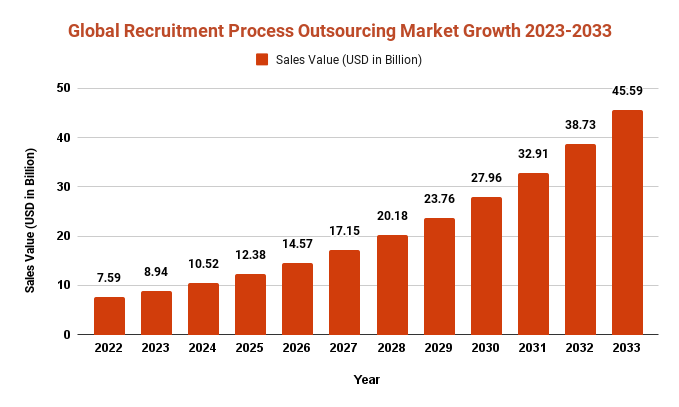Recruitment Process Outsourcing Market Expected to Expand at a Growing CAGR of 17.7% through 2033

Page Contents
Market Overview
Published Via 11Press: Recruitment Process Outsourcing (RPO) is a type of business process outsourcing in which an organization outsources some or all of their recruitment processes to an external provider. Recruitment Process Outsourcing Market providers specialize in managing the entire recruitment process for their clients, from sourcing to screening to interviewing and onboarding candidates. The RPO model offers several advantages to organizations such as cost savings, improved hiring quality, scalability and reduced administrative work. RPO providers use various tools and technologies to streamline the hiring process while providing real-time data and analytics to their clients.
The Global Recruitment Process Outsourcing market represented USD 7.59 Bn in 2022 and will anticipate around USD 45.59 Bn by 2033 projected around CAGR of 17.7% amid forecast frame of 2023 to 2033.
RPO services can be delivered in a number of models, including on-site, off-site or both. On-site RPO involves the provider working at the client's office while off-site RPO requires them to work remotely. Hybrid models may also be designed tailored for each organization's individual requirements.
Key Takeaways
- The Recruitment Process Outsourcing Market expected to reach USD 7.59 Billion in 2023.
- Forecasted compound annual growth rates between 2023 and 2033 is 17.7%.
- By 2033, the Recruitment Process Outsourcing Market is projected to reach USD 45.59 Billion.
- North America is the leading market for RPO, accounting for most of global RPO revenue.
- The Asia-Pacific RPO market is expanding rapidly, driven by rising demand for recruitment outsourcing in the region.
- RPO (Recruitment Process Outsourcing) – RPO is a type of business process outsourcing in which an organization outsources some or all of its recruitment processes to an external provider.
- RTR (Real-Time Recruiting) can offer cost savings, improved hiring quality, scalability, reduced administrative burden and access to specialized recruitment expertise.
- RPO providers provide a range of services, such as sourcing, screening, interviewing, onboarding and analytics. They may work onsite, off-site or in a hybrid model.
- RPO providers utilize a range of tools and technologies to streamline the recruitment process, such as applicant tracking systems, artificial intelligence, and predictive analytics.
- RPO solutions can be tailored to fit the organization's individual requirements, with the flexibility to scale up or down as required.
- RPO providers typically possess in-depth knowledge of employment laws and regulations, guaranteeing that the recruitment process complies with legal requirements.
- RPO providers can serve as a strategic partner, engaging closely with the organization to comprehend their hiring requirements, culture, and values.

Request For Sample Report: https://marketresearch.biz/report/recruitment-process-outsourcing-market/request-sample/
Regional Snapshot
- North America is the leading market for RPO, accounting for most of global RPO revenue. The United States leads this region followed by Canada. RPO providers in North America offer a variety of services such as end-to-end recruitment, project-based recruiting and niche recruiting.
- The European RPO market is expanding rapidly, driven by increased demand for recruitment outsourcing in the region. The United Kingdom, Germany and France are the three largest markets for RPO providers in Europe. These providers provide a variety of services such as volume hiring, executive search and temporary staffing to meet client demands.
- The Asia-Pacific RPO market is expanding rapidly, driven by rising demand for recruitment outsourcing in the region. China, India and Japan are the three leading RPO markets within this region. RPO providers in this region provide a range of services such as recruitment marketing, employer branding and recruitment technology to meet client demands.
- The Latin American RPO market is small but growing. Brazil, Mexico, and Argentina are the three primary RPO markets in Latin America. RPO providers in this region offer services such as recruitment process design, workforce planning, and recruitment strategy consulting.
- The Middle East & Africa RPO market is relatively small but growing. The United Arab Emirates, South Africa, and Saudi Arabia are the three largest markets for RPO providers in this region. These providers provide services such as talent mapping, diversity recruiting, and executive search to clients.
Inquire with our industry specialist: https://marketresearch.biz/report/recruitment-process-outsourcing-market/#inquiry
Drivers
- Cost Savings: One of the primary motivations behind RPO is cost effectiveness. Outsourcing recruitment processes can help organizations save money on expenses such as advertising, job board fees and software licenses. Furthermore, RPO can reduce internal recruitment teams' overhead costs by outsourcing some or all of the recruitment process.
- Talent Scarcity: In a tight labor market, finding and attracting top talent can be an immense challenge. RPO providers possess specialized expertise and resources that enable organizations to identify and connect with qualified candidates even during times of high competition in the job market.
- Improved Quality of Hires: RPO providers often employ cutting-edge recruitment technology, such as artificial intelligence and data analytics to enhance the quality of hires. This enables organizations to recruit more qualified individuals who are better suited for their roles and culture.
- Scalability: RPO providers can assist organizations in scaling their recruitment processes quickly and efficiently, which is especially advantageous for companies experiencing rapid growth or needing to fill multiple roles simultaneously.
- Compliance: RPO providers often possess in-depth knowledge of employment laws and regulations, which can give organizations peace of mind that their recruitment processes adhere to legal requirements.
- Focus on Core Business Operations: Outsourcing recruitment processes allows organizations to prioritize their core business operations rather than dedicating time and resources towards recruitment activities.
Restraints
- RPO can save organizations money in the long run on recruitment costs, but there may be upfront expenses involved with outsourcing certain processes. Costs associated with selecting and onboarding an RPO provider, as well as any technology or software needed to facilitate the outsourcing relationship, can all be included.
- Outsourcing recruitment processes can result in a loss of control over the hiring process, which may make some organizations uneasy. RPO providers typically collaborate closely with their clients to ensure they have a say in the recruitment process, though ultimately it may still be up to the RPO provider to make final decisions. Integrating an RPO provider with an organization's internal recruitment team can be difficult if there is lack of communication or transparency between them. This may cause duplication of efforts or confusion over roles and responsibilities.
- RPO providers may not always possess a comprehensive understanding of an organization's culture and values, making it challenging to identify candidates that fit well for the company. Although outsourcing recruitment processes can save time in the long run, an initial investment of effort may be needed upfront in onboarding an RPO provider and creating the outsourcing relationship. Furthermore, RPO providers may not always deliver on their promises, potentially placing your organization at risk if they fail to achieve desired outcomes.
Opportunities
- Expertise: RPO providers have specialized expertise in recruitment, sourcing, and talent acquisition, which can be leveraged by organizations to improve their recruitment processes. RPO providers can also provide insights and recommendations on best practices and industry trends, which can help organizations stay ahead of the competition.
- Access to Talent: RPO providers have access to a broad pool of talent and can use advanced recruitment technologies to identify, attract and engage with qualified candidates. This can help organizations find and attract talent they might not have been able to access on their own.
- Scalability: RPO providers can help organizations scale their recruitment process up or down as needed. This is particularly beneficial for organizations that experience seasonal fluctuations in hiring or those that are rapidly growing.
- Reduced Time to Hire: RPO providers have streamlined recruitment processes that can help organizations reduce their time to hire. This can help organizations fill vacancies faster, reduce the cost of unfilled roles, and improve their overall hiring outcomes.
- Improved Candidate Experience: RPO providers can improve the candidate experience by providing a seamless recruitment process, timely feedback, and personalized communication. This can help organizations attract top talent and improve their employer brand.
- Strategic Partnership: RPO providers can become a strategic partner to organizations by providing insights into recruitment processes, workforce planning, and talent acquisition strategies. This can help organizations align their recruitment strategies with their overall business goals and objectives.
Challenges
- Integrating an RPO provider with an organization's internal recruitment team can be a complex undertaking. There may be duplication of effort or miscommunication regarding roles and responsibilities, leading to breakdowns in communication and collaboration. RPO providers may lack an in-depth knowledge of an organization's culture and values, making it challenging to identify candidates who fit well. This could lead to a poor candidate experience and increased turnover rates.
- RPO providers may not always deliver on their promises, which puts an organization at risk if the RPO provider cannot produce desired outcomes. Furthermore, if a RPO provider hasn't been thoroughly vetted, there could be data breaches, violations of compliance regulations, or other legal issues to contend with.
- Outsourcing recruitment processes can result in a loss of control over the hiring process, which may cause some organizations to feel uncomfortable. RPO providers typically collaborate closely with their clients to ensure they have a voice in the recruitment process, but ultimately it may still be up to the RPO provider to make final decisions.
- RPO can ultimately save organizations money on recruitment expenses, but there may be upfront expenses associated with outsourcing certain recruitment processes. Costs associated with selecting and onboarding an RPO provider, as well as any technology or software needed for the outsourcing relationship, may all need to be factored in. Effective communication is paramount to the success of an RPO partnership; however, communication issues may arise due to differences in time zones.
Market Segmentation
Recruitment Process Outsourcing (RPO) Market, by Engagement Type
- On-demand RPO
- End-to-end RPO
Recruitment Process Outsourcing (RPO) Market, by End-use Industry
- Banks, Financial Services, and Insurance (BFSI)
- IT, ITeS
- Telecommunication
- Manufacturing
- Healthcare and Pharmaceuticals
- Hospitality
- Others (Aerospace, Marine, and Construction Industry)
Key Players
- Kenexa Corporation (an IBM Corporation Company)
- Randstad Holding Company
- Accolo Inc.
- Atterro Human Capital Group
- Kelly Outsourcing
- Consulting Group
- Cielo Inc. (Pinstripe Inc.)
- ManpowerGroup Solutions
- Pontoon Solutions
- Zyoin Web Pvt. Ltd.
- Futurestep (a Korn Ferry Company)
- TalentFusion Inc.
- Alexander Mann Solutions
- Hudson Global Inc.
Report Scope
| Report Attribute | Details |
| Market size value in 2022 | USD 7.59 Bn |
| Revenue forecast by 2033 | USD 45.59 Bn |
| Growth Rate | CAGR Of 17.7% |
| Regions Covered | North America, Europe, Asia Pacific, Latin America, and Middle East & Africa, and Rest of the World |
| Historical Years | 2017-2022 |
| Base Year | 2022 |
| Estimated Year | 2023 |
| Short-Term Projection Year | 2028 |
| Long-Term Projected Year | 2033 |
Growing Demand => Request for Customization
Recent Developments
The rapid advancements in technology have spurred the emergence of digital recruitment platforms, such as job portals, social media networks, and recruitment analytics tools. RPO providers have adopted these tools to provide better services to their clients, including automation of processes, real-time data analytics and candidate screening. Furthermore, the rise of the gig economy has made it simpler for companies to hire contract workers on specific projects. RPO providers have evolved their services to meet the increasing need for flexible staffing solutions. There has been an escalating emphasis on DEI in the workplace, and RPO providers are expected to assist companies in attracting and retaining diverse talent. Therefore, RPO providers are now focused on crafting DEI strategies that align with their clients' objectives.
Hybrid RPO offers the advantages of both in-house and outsourced recruitment processes, working closely with a client's internal recruitment team to offer additional support when needed. RPO providers are now paying greater attention to candidate experience by employing tools like chatbots and AI-powered interview scheduling in an effort to make the recruitment process smoother for applicants. With the pandemic forcing virtual recruitment into mainstream operations, RPO providers have had no choice but to adjust quickly; now offering virtual job fairs, interviews, and assessments online for candidates.
Key Questions
1. What is RPO?
RPO stands for Recruitment Process Outsourcing, which is a business model in which companies outsource some or all of their recruitment processes to an external provider.
2. What are the Advantages of RPO?
RPO offers numerous advantages, such as cost-savings, improved efficiency, access to expert knowledge, and enhanced candidate experience.
3. What types of recruitment processes can be outsourced?
Outsourced recruitment solutions include job posting, candidate sourcing and screening, interviewing, assessment of candidates and offer management.
4. What factors should be taken into account when selecting an RPO provider?
When selecting an RPO provider, factors like experience and expertise, scaling capabilities, technology/data analytics skillsets, success rate and cultural fit with your company should all be taken into account.
5. How is RPO Different From Traditional Staffing?
RPO stands out from traditional staffing in that it takes care of the entire recruitment process, from job posting to offer management; while staffing agencies usually focus on filling specific job vacancies.
6. What is the client company's role in the RPO process?
The client company collaborates closely with the RPO provider to identify recruitment needs, provide input on job descriptions and requirements, as well as make hiring decisions.
7. Can RPO providers offer flexible staffing solutions?
Yes, RPO providers can offer staffing options such as contract staffing and project-based staffing in addition to permanent placements.
8. How does RPO contribute to improving the candidate experience?
RPO providers can enhance candidates' experiences by using technology for easier recruitment processes, providing timely communication and feedback, and creating a positive atmosphere throughout the recruitment process.
Contact us
Contact Person: Mr. Lawrence John
Marketresearch.Biz (Powered By Prudour Pvt. Ltd.)
Tel: +1 (347) 796-4335
Send Email: [email protected]
The team behind market.us, marketresearch.biz, market.biz and more. Our purpose is to keep our customers ahead of the game with regard to the markets. They may fluctuate up or down, but we will help you to stay ahead of the curve in these market fluctuations. Our consistent growth and ability to deliver in-depth analyses and market insight has engaged genuine market players. They have faith in us to offer the data and information they require to make balanced and decisive marketing decisions.



